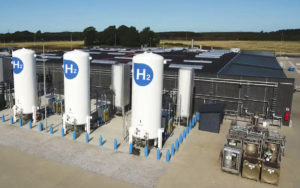The CIB’s new program, which was unveiled at Electric Mobility Canada’s annual conference in Toronto, will offer repayable capital support to large-scale infrastructure projects of $10 million or more

The Canadian Infrastructure Bank (CIB) has launched a $500-million zero-emission vehicle (ZEV) Charging and Hydrogen Refuelling Infrastructure Initiative (CHRI).
The CIB’s new program, which was unveiled at Electric Mobility Canada’s annual conference in Toronto, will offer repayable capital support to large-scale infrastructure projects of $10 million or more
The Canadian Infrastructure Bank (CIB) has launched a $500-million zero-emission vehicle (ZEV) Charging and Hydrogen Refuelling Infrastructure Initiative (CHRI).
The money will be distributed to projects across Canada with capital costs of $10 million or more and involving different types of major private-sector corporations, including large retailers that want to run charging as a business, and gas station networks.
“We’re looking for large scale,” says Charles Todd, managing director of investments at Canada Infrastructure Bank in an interview with Electric Autonomy Canada. “We want the private sector to really take an aggressive approach to implementation earlier and sooner. So, that’s our target.”
Todd announced the CIB’s new funding stream at Electric Mobility Canada‘s annual electric vehicle conference — held this year at the Beanfield Centre in Toronto — alongside Julie Dabrusin, parliamentary secretary to the Minister of Natural Resources and to the Minister of Environment and Climate Change.
The two were part of a lineup of speakers throughout the day at the conference that heavily featured talks on the challenges of charging infrastructure.
“We need the private sector,” agrees France Lampron, director of mobility at Hydro-Québec (owner of the Electric Circuit charging network in Quebec), speaking on a separate panel. “We don’t see them as competitors.”
Greater uptime oversight coming for CIB funding
As part of the CIB funding rules, private sector partners will be required to submit charger uptime records to the CIB.
“It’s a fundamental part of the loans that we’re making,” says Todd. “We expect a certain level of uptime.”
The CIB’s policy is simple: all private-sector partners will be repaying their loan at a set minimum, which will based on an as-yet-undeclared uptime percentage.
“If that uptime is not met…you’ll essentially have to repay us, even though you don’t have associated revenue with it,” explains Todd. “We hope that it really incentivizes good maintenance and really high levels of uptime, that the industry should really be aiming for.”
Todd clarified to Electric Autonomy that the onus to track uptime will be on the private sector because “they have the technology to do that.” Private sector partners will, under the terms of their loan agreement, be required to submit that data to the CIB.
It’s not just the CIB that’s interested in bringing greater transparency to the issue of uptime. Both Lampron and Louise Tanguay, senior manager of infrastructure programs at Natural Resources Canada (NRCan) — which funds charging infrastructure installation through the Zero-Emission Vehicle Infrastructure Program (ZEVIP) — said charger reliability is paramount in their respective roles. “It’s the top thing on my radar right now,” says Tanguay.
Multiple ways of generating charger revenue
In addition to the fee a charging network bills to customers that come to plug in, there is another way to generate revenue from charging stations, says Todd.
Under the new Clean Fuel Regulations there is a pathway for charging stations to generate carbon credits that can then be sold on the market. With that option now available to private sector network operators it provides another way to repay their loan to the CIB.
“We’re going to be looking at the holistic view of how the chargers are utilized and how they’re generating revenue. Those will be the kind of repayment sources that are available for us,” says Todd.
“The private sector is going to play a big role in this. We’re looking to incentivize the private sector to step up and work with government to solve these problems and not rely on government to solve them.”
Private companies will be able to apply for the CIB funding through a single portal via NRCan and “[c]harging infrastructure supported by the CIB will remain eligible for NRCan funding to the extent required for the project to remain commercially viable,” reads the CIB press announcement.






